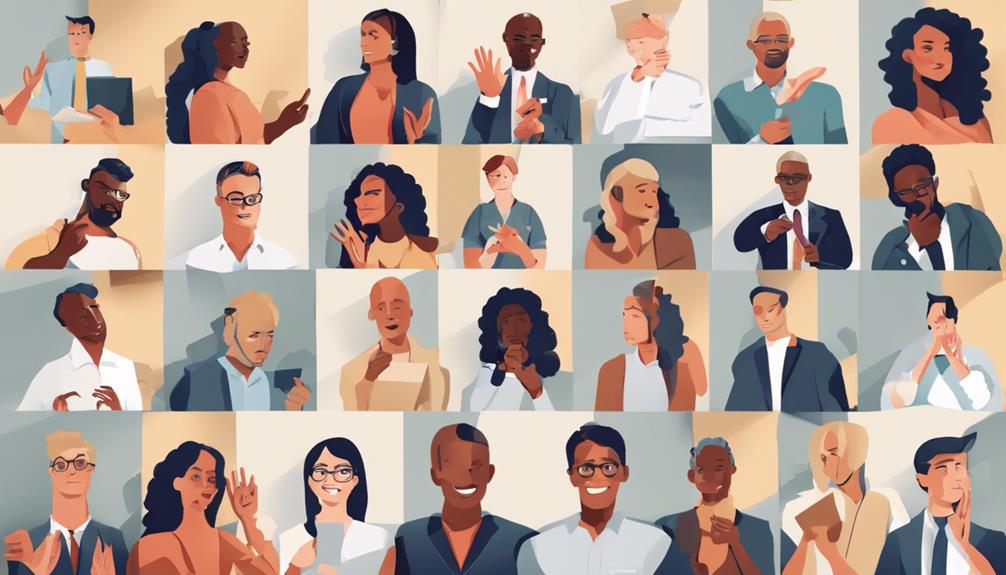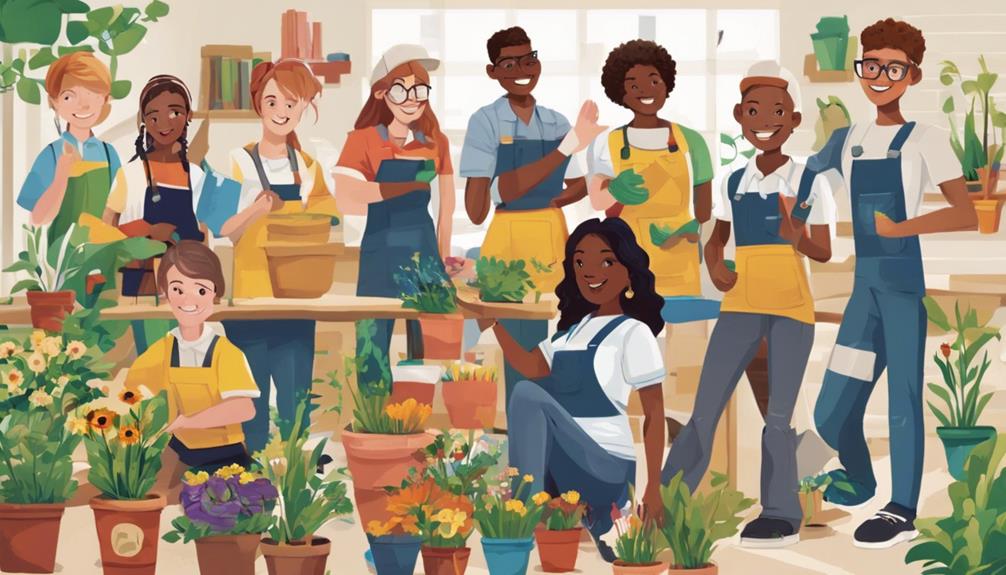Reflecting on the incredible impact of these seven deaf social workers, it is clear that their dedication to advocacy and support knows no bounds and serves as a catalyst for positive change.
Each story encapsulates resilience and determination, showcasing the profound difference that can be made through compassion and dedication.
Their unique perspectives and innovative approaches challenge conventional norms, sparking conversations and fostering progress within the realm of social work.
Amidst the challenges they face, their unwavering spirit serves as a beacon of hope and empowerment, leaving us eager to uncover more about their transformative journeys.
Key Takeaways
- Deaf social workers advocate for Deaf rights and challenge systemic inequalities.
- They provide culturally sensitive support, empower marginalized groups, and promote inclusivity.
- Through effective communication strategies, they bridge gaps, empower individuals, and foster community resilience.
- Promoting equality, they advocate for policy changes, celebrate Deaf culture, and champion unheard voices.
Pioneering Advocacy Work
How do deaf social workers pioneer advocacy work to champion equal access for the Deaf community?
Deaf social workers are at the forefront of advocating for the rights and needs of the Deaf community. By utilizing innovative communication methods, they bridge the gap between Deaf individuals and their hearing counterparts, ensuring equal access to resources and services. These dedicated professionals not only advocate for equal opportunities but also strive to promote and preserve the rich Deaf culture.
Through their advocacy work, Deaf social workers lead initiatives that push for policy changes and raise awareness about the unique challenges faced by the Deaf population. They play a vital role in empowering Deaf individuals and fostering a more inclusive society. By providing culturally competent support, they pave the way for positive social change and help create a more equitable environment for all. Deaf social workers are true champions of equality and work tirelessly to ensure that the voices of the Deaf community are heard and respected.
Community Support Initiatives

Deaf social workers passionately spearhead impactful community support initiatives to enhance the well-being and empowerment of deaf and hard-of-hearing individuals. These dedicated professionals understand the unique challenges faced by the deaf community and work tirelessly to provide essential support services. By utilizing American Sign Language (ASL) as a means of communication, deaf social workers ensure effective and empathetic interactions with their clients. Through advocacy and program development, they promote social inclusion and facilitate access to resources that enable deaf individuals to thrive.
| Support Services | Social Inclusion | Advocacy |
|---|---|---|
| Mental health support | Community engagement | Equal opportunities |
| Employment assistance | Educational programs | Policy influence |
| Peer support programs | Accessible services | Legal aid |
| Family counseling | Cultural awareness | Rights protection |
| Skill-building workshops | Inclusive events | Systemic change |
Deaf social workers play a vital role in empowering the deaf community to lead independent and fulfilling lives. Through their unwavering dedication and innovative approaches, they pave the way for a more inclusive society where deaf individuals can thrive.
Impactful Counseling Services
We understand the essential role of impactful counseling services in the Deaf community, where effective communication strategies are key to providing meaningful support.
Deaf social workers adeptly navigate communication barriers using visual methods, like Sign Language interpreters, to ensure their clients receive the care they deserve.
Through their dedicated efforts, these professionals promote mental health awareness and empower Deaf individuals to seek the help they need.
Counseling for Deaf Community
Providing culturally and linguistically appropriate counseling services, Deaf social workers play a vital role in supporting the mental health and well-being of the Deaf community. These professionals offer guidance in Sign Language, ensuring effective communication and understanding for Deaf individuals facing mental health issues, family dynamics, and societal barriers. Through advocacy efforts, Deaf social workers champion the rights and inclusivity of the Deaf community within counseling services, promoting accessibility and support. Their work is instrumental in empowering and building resilience in Deaf individuals, leading to positive mental health outcomes and a stronger sense of community.
| Role of Deaf Social Workers |
|---|
| Provide culturally and linguistically appropriate counseling |
| Advocate for Deaf community rights |
| Offer support in Sign Language |
| Empower Deaf individuals |
| Foster positive mental health outcomes |
Strategies for Effective Communication
Understanding the nuances of effective communication strategies is paramount in ensuring impactful counseling services for individuals in the Deaf community. To enhance communication and support Deaf individuals effectively, we embrace innovative approaches such as:
- Utilizing Sign Language interpreters: Ensuring clear understanding by incorporating skilled interpreters in counseling sessions.
- Leveraging visual aids: Enhancing communication through written materials and diagrams to facilitate deeper engagement.
- Addressing cultural and linguistic needs: Tailoring support by acknowledging and respecting the unique requirements of Deaf clients.
Empowering Marginalized Groups

In the quest for social justice, deaf social workers champion the empowerment of marginalized groups through culturally sensitive advocacy and support. They navigate communication barriers and address systemic inequalities to ensure that marginalized communities have access to essential services. By collaborating with community organizations, they develop inclusive programs tailored to meet the unique needs of each group. Through their tireless advocacy efforts, deaf social workers challenge existing norms and work towards a more equitable society for all individuals.
| Culturally Sensitive Support | Advocacy | Inclusive Programs |
|---|---|---|
| Providing tailored assistance that respects the cultural backgrounds of marginalized communities | Speaking up for the rights and needs of those who are often overlooked or unheard | Creating initiatives that welcome and cater to the diverse requirements of marginalized populations |
Their commitment to social justice and inclusivity empowers marginalized groups to overcome barriers and achieve positive outcomes in their lives. Together, we can strive for a more inclusive and compassionate society where every individual is valued and supported.
Promoting Inclusivity and Accessibility

Championing the rights of marginalized groups, deaf social workers actively advocate for inclusivity and accessibility, ensuring that all individuals, regardless of hearing ability, have equal opportunities in society. Deaf social workers promote inclusivity and accessibility through:
- Utilizing Sign Language: They use Sign Language to communicate with Deaf clients, breaking down communication barriers and creating a supportive environment where everyone can express themselves effectively.
- Tailoring Services to Deaf Community Needs: They promote access to resources, services, and information specifically tailored to the unique needs of the Deaf community, ensuring that no one is left behind.
- Implementing Inclusive Practices: Collaborating with organizations, they work to implement inclusive practices and policies that benefit Deaf individuals in social work settings, fostering empowerment and a sense of belonging within the community.
Through their dedication to inclusivity and accessibility, Deaf social workers play a crucial role in empowering and uplifting the Deaf community, creating a more equitable and supportive society for all.
Social Justice Efforts

As social workers, we stand united in our commitment to advocating for fairness, promoting equality for all, and empowering marginalized communities.
Through our social justice efforts, we strive to dismantle barriers and create a more inclusive society where every individual has the opportunity to thrive.
Together, we work towards a future where justice and equality aren't just ideals but lived realities for all.
Advocating for Fairness
Working tirelessly to dismantle barriers and advocate for equality, deaf social workers are at the forefront of promoting fairness for the deaf community. Here are three ways they're advocating for fairness:
- Promoting Equal Access: Deaf social workers strive to ensure that the deaf community has access to resources and services on par with the hearing population, advocating for accommodations that level the playing field.
- Addressing Systemic Barriers: They work towards social justice by identifying and challenging systemic barriers that prevent deaf individuals from fully participating in society, advocating for policies that break down these barriers.
- Celebrating Deaf Culture: Deaf social workers play a vital role in educating others about deaf culture, challenging misconceptions, and fostering awareness to create a more inclusive and understanding society.
Promoting Equality for All
Through advocating for equality and social justice, deaf social workers exemplify unwavering commitment to uplifting all individuals, especially those facing systemic inequalities. These dedicated professionals actively engage in community organizing and policy advocacy to promote equal rights and opportunities for marginalized communities, including those with disabilities. By creating inclusive environments and collaborating with diverse stakeholders, deaf social workers empower individuals to access essential resources and services. Their work highlights the significance of addressing systemic barriers and promoting social justice for a more equitable society. Let's explore their efforts through the table below:
| Initiatives | Impact |
|---|---|
| Community Organizing | Fosters unity and empowerment |
| Policy Advocacy | Influences systemic change |
| Educational Initiatives | Promotes awareness and inclusion |
| Inclusive Environments | Encourages diversity and accessibility |
| Stakeholder Collaboration | Enhances collective impact |
Empowering Marginalized Communities
In our efforts to empower marginalized communities through social justice initiatives, deaf social workers stand as beacons of advocacy and support, championing the voices of those often unheard. They're dedicated to addressing systemic inequalities and promoting equity for underserved populations.
Through their unique perspective, they create inclusive programs and services tailored to the needs of marginalized groups, empowering individuals to navigate challenges and strive for a better future. By bridging gaps in access to resources and opportunities, deaf social workers play a vital role in building more resilient and cohesive communities.
Their unwavering commitment to social justice not only uplifts those in need but also fosters a sense of belonging and empowerment among marginalized populations.
Transformative Outreach Programs

Collaborating closely with Deaf organizations and community leaders, Deaf social workers have developed transformative outreach programs tailored to the unique needs of the Deaf community. These outreach programs prioritize accessibility, inclusivity, and cultural awareness, ensuring that Deaf individuals receive the vital social services they require. By integrating Sign Language and cultural sensitivity into their initiatives, these social workers effectively bridge communication gaps and foster a sense of belonging within the Deaf community.
Through these innovative programs, Deaf social workers not only provide essential services like mental health support, advocacy, and education but also empower Deaf individuals to navigate societal challenges successfully. By working hand in hand with Deaf organizations and community leaders, these social workers amplify the visibility and impact of their outreach efforts, ultimately enhancing the well-being of the Deaf community as a whole. The transformative nature of these outreach programs lies in their ability to empower Deaf individuals, offering them the tools and resources needed to lead fulfilling lives despite the barriers they may face.
Frequently Asked Questions
Who Was the Impactful Deaf Person?
We think the impactful Deaf person referred to is Helen Keller. She was a remarkable activist who overcame immense challenges to earn a bachelor's degree and advocate for disability and women's rights.
Helen's inspiring journey paved the way for many others and continues to be a beacon of hope and empowerment. Her legacy of resilience and determination is a testament to the strength and potential within the Deaf and Deaf-blind community.
What Contributions Have Deaf People Made to Society?
We've witnessed remarkable contributions from deaf individuals across various fields. From Helen Keller's advocacy to Beethoven's music, deafness hasn't stopped them from making a lasting impact.
Figures like Marlee Matlin and Matt Hamill continue to break barriers in entertainment and sports. Educators like Laura Bridgman have raised awareness about deaf culture and rights.
Their achievements inspire us all to strive for inclusivity and equality.
What Are 3 Good Examples of Deaf Culture?
When we think of examples of Deaf culture, we often consider the rich traditions of American Sign Language, the strong sense of community and shared experiences, and the advocacy for equal opportunities and social inclusion. These elements form the foundation of Deaf culture, reflecting values of acceptance, communication, and empowerment.
Embracing these aspects not only celebrates diversity but also challenges societal norms and promotes a more inclusive world for all.
What Are the 4 Core Values of Deaf Culture?
When we explore Deaf culture, we find four core values that shape our community:
- respect for Sign Language,
- communication access,
- direct honesty, and
- identity preservation.
These values empower us to embrace our unique perspectives and advocate for inclusivity.
Our culture thrives on equality, autonomy, and challenging audist beliefs. By upholding these principles, we create a supportive environment where Deaf individuals can flourish and make meaningful contributions.
How Can Deaf Social Workers Make a Difference in the Deaf Community?
Deaf social workers are vital in ways helping hands assist deaf community. They bridge communication gaps, provide essential resources, and advocate for the unique needs of the deaf community. By understanding the specific challenges faced by deaf individuals, they can make a significant difference in improving access to services and overall quality of life.
Conclusion
In conclusion, these incredible deaf social workers aren't just changing lives, they're reshaping the very fabric of our society. Their dedication, passion, and unwavering commitment to advocacy and empowerment are truly awe-inspiring.
They aren't just making a difference, they're revolutionizing the way we view and support marginalized communities. Their impact is immeasurable, their influence unmatched.
We're privileged to witness their transformative work and grateful for the positive change they bring to our world.










